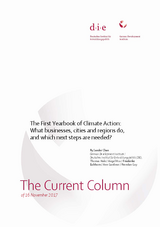Die aktuelle Kolumne
The First Yearbook of Climate Action: What businesses, cities and regions do, and which next steps are needed?
Chan, Sander / Thomas Hale / Angel Hsu / Friederike Eichhorn / Ann Gardiner / Brendan GuyDie aktuelle Kolumne (2017)
Bonn: German Development Institute / Deutsches Institut für Entwicklungspolitik (DIE), The Current Column of 16 November 2017
Bonn, 16 November 2017. The first Yearbook of Climate Action shows that effective climate action by businesses, cities and regions, and other actors could make significant contributions to narrowing the global emissions gap, adapting to climate change, and demonstrating to governments that higher ambition is desirable and doable. Moreover, climate action is growing in the global South, and many climate action initiatives are producing outputs toward their goals. Key challenges of inclusion and scope remain, however, creating an urgent need to invest in scaling up climate action – and the framework supporting it – in 2018. It is difficult to overestimate the importance of actions by businesses, investors, civil society, cities and regions in today’s climate crisis. Pledges by governments under the Paris Agreement would still translate into 3°C warming or more, resulting in adverse impacts for a majority of people, and high risk of irreversible economic and ecological disruptions. Non-state and subnational actions could significantly narrow the global mitigation gap, as well as promote adaptation, especially in developing countries. The first Yearbook on Global Climate Action by the High-level Climate Action Champions, launched at the closing of the high-level Global Climate Action sequence at COP23, shows that non-state actors are starting to deliver. First, the groundswell of climate action is expanding and diversifying; businesses, investors, civil society, cities and regions are not only making concrete contributions to reduce greenhouse gases, they are also addressing the need to adapt to already occurring climate change, and to build resilience among vulnerable communities. Second, climate action is truly becoming a global affair engaging stakeholders from all sectors, and across developed and developing countries. Although most climate actions are still led by actors based in the Global North, they are rapidly scaling up implementation in developing countries. Third, climate actions are becoming increasingly effective. The vast majority of current climate commitments are no longer just promises on paper; but they have become concrete actions, making real contributions to climate mitigation and adaptation. Notwithstanding these encouraging trends, much of the vast potential of non-state and subnational actors remains unrealised. For instance, small and medium enterprises (SMEs) are underrepresented in the Marrakech Partnership, even though they contribute up to 60 per cent of employment and up to 40 per cent of economic output in emerging economies. For many developing countries, the shares of SMEs are even higher. Moreover, rural communities are currently underrepresented, even though they make up around half of the world’s population. A total transformation as implied by the Paris Agreement goal to achieve a carbon neutral world by the second half of the century can leave no single stakeholder group, sector or community behind. As indicated in the Yearbook on Global Climate Action, businesses, civil society organisations, local governments and other actors run into operational challenges. They face a lack of (access to) funding, expert knowledge, and/or organisational capacity to implement their commitments. To ensure greater effectiveness over time, the Marrakech Partnership should consider additional ways to scale-up support to individual cities, businesses, civil society groups, and others seeking to deliver climate action on the ground. As the world faces an urgent mitigation challenge in the next few years, a focus on large-scale mitigation actions is necessary and desirable. However, climate action encompasses more than mitigation. The impact of climate change is already wreaking havoc on vulnerable communities and developing countries. While non-state and subnational climate actions are diversifying, too little attention is still given to building climate resilience and adaptation capacity. The Marrakech Partnership should continue to incentivise and spotlight adaptation and resilience actions, especially in developing countries. It is welcome news that the large majority of climate commitments are more than promises on paper; they are starting to deliver relevant outputs that could lead to desired changes in environmental and social indicators. However, data gaps continue to hamper a comprehensive valuation of non-state and subnational climate actions. For instance, limited data availability and the use of different methodologies to assess mitigation impacts hinder a clearer understanding of aggregate contributions of non-state and subnational actions. Stronger cooperation between data platforms and collaboration between data-analysts can help resolve knowledge gaps. Finally, as the Marrakech Partnership for Global Climate Action moves forward, its continued success will depend on increased support from the governments in the UNFCCC process, the UNFCCC Secretariat, and other actors. To implement the Paris Agreement, we need to turn the Marrakech Partnership into a more effective bridge between parties and other actors. Cities, businesses, investors, and civil society can help to meet existing Nationally Determined Contributions (NDCs) while also identifying new opportunities to enhance ambition going forward. In 2018, the Talanoa Dialogue and the Global Climate Action Summit in California create an enormous opportunity to go further, faster, together. Sander Chan is a Senior Researcher at German Development Institute / Deutsches Institut für Entwicklungspolitik (DIE) and Adj. Asst Professor at Copernicus Institute of Sustainable Development (Utrecht University), Thomas Hale is an Associate Professor in Public Policy (Global Public Policy) at the Blavatnik School of Government, University of Oxford, Angel Hsu is an Assistant Professor of Environmental Studies at Yale-NUS College and Adjunct of the Yale School of Forestry and Environmental Studies, Friederike Eichhorn is a Researcher at German Development Institute / Deutsches Institut für Entwicklungspolitik (DIE), Ann Gardiner is Director at AG Climate and Energy Ltd, Brendan Guy is a Manager at Natural Resources Defense Council (NRDC).


